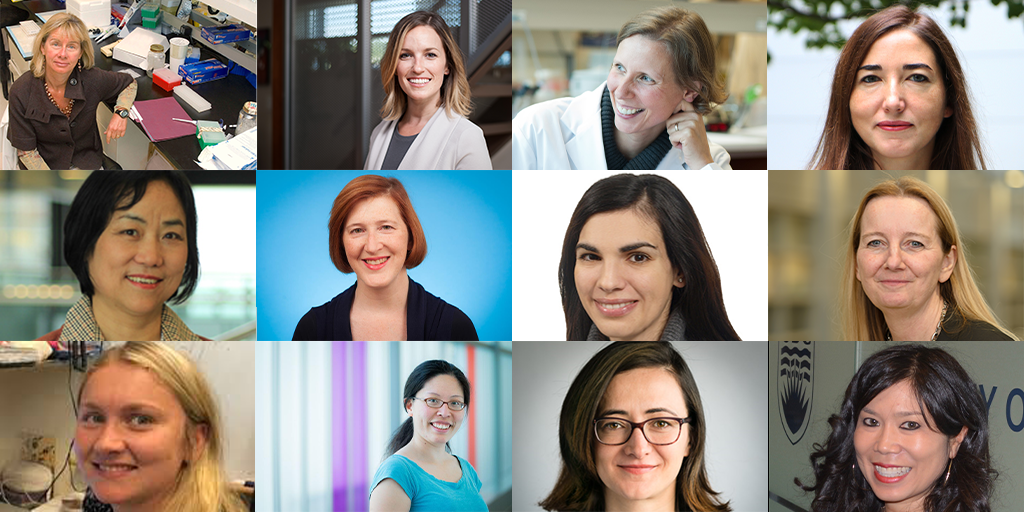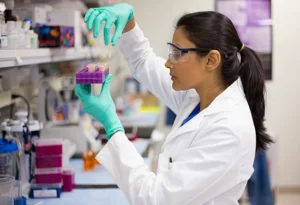
March 8, 2021
March 8 marks International Women’s Day (IWD) globally. This 2021 campaign theme is #ChooseToChallenge:
‘A challenged world is an alert world. Individually, we’re all responsible for our own thoughts and actions – all day, every day. We can all choose to challenge and call out gender bias and inequality. We can all choose to seek out and celebrate women’s achievements. Collectively, we can all help create an inclusive world. From challenge comes change, so let’s all choose to challenge.’ https://www.internationalwomensday.com/
JDRF is pleased to rise to the challenge by celebrating the achievements of our women researchers. We are the leading charitable funder of research into cures and disease modifying therapies for type 1 diabetes (T1D). Among the many people working tirelessly to help create a world free from T1D are a number of exceptionally talented women.
Meet some of our women researchers:
Dr. Gillian Booth, a JDRF-funded scientist at the Centre for Urban Health Solutions within the Li Ka Shing Knowledge Institute of St. Michael’s Hospital in Toronto, and a team of researchers are aiming to improve glucose control and patient experiences by using modern technologies to optimize the way health care is delivered to people with T1D.
Dr. Yi-Chun Chen is a postdoctoral fellow at the University of British Columbia. She earned her Bachelor of Science in medical laboratory science at Taipei Medical University in Taiwan, her Master of Science in cell biology at the University of Connecticut and her PhD in cellular and integrative physiology from Indiana University School of Medicine in the United States.
Dr. Jayne Danska holds the Anne and Max Tanenbaum Chair in Molecular Medicine. She is a professor at the University of Toronto Faculty of Medicine and a senior scientist at The Hospital for Sick Children. Her research addresses the idea that the dramatic increase in autoimmune and inflammatory diseases over the past 50 years results, in part, from changes in our exposure to microbes. She is studying the role of the community of microbes that inhabit the human intestine (the microbiome) in altering risk for, and the progression of, T1D. The ultimate objective of her work is to identify new therapeutics to prevent the disease.
Dr. Heather Denroche (BC) – is a postdoctoral fellow at the University of British Columbia who is currently examining a hormone called islet amyloid polypeptide (IAPP), produced by pancreatic beta cells and released in response to elevated glucose, in order to better understand the role it plays in the loss of beta cells leading to T1D, as well as in transplanted stem cell-derived beta cells.
Dr. Suheda Erener is a research associate in the Faculty of Medicine at the University of British Columbia. Her study focuses on developing biomarkers that can predict the development of T1D. She is also investigating the role of non-coding RNAs in beta cell demise during T1D pathogenesis to unravel signaling pathways to stop beta cell destruction and/or enhance beta cell survival and function.
Dr. Kirsten Ward Hartstonge is a postdoctoral fellow at the University of British Columbia. Her research focuses on the role of regulatory T cells (Tregs) in human diseases such as T1D. She is investigating how Treg number and function may be used as a biomarker to predict if a patient is going to respond to a treatment or not.
Dr. Ya-Ching (Amanda) Huang, PhD, MSN, RN, a researcher focused on diabetes self-management and public health issues affecting underserved populations. She is studying the association between physical activities, sleep, and diabetes management; their psycho-social mechanisms; and programs that are culturally tailored to help enhance patients’ quality of life as well as caregiver effectiveness.
Dr. Megan Levings, BC Children’s Hospital Research Institute in collaboration with Dr. Jan Dutz (BC) are investigating whether the administration of an antibody called ustekinumab (include blog link here when ready) among adults and children newly diagnosed with T1D can protect insulin-producing beta cells.
Dr. Despoina Manousaki is a postdoctoral fellow at McGill University and a researcher at the Jewish General Hospital (Lady Davis Institute) in Montreal. Her recently published study has shown that low levels of vitamin D are not associated with increased likelihood of T1D.
Dr. Kathy McCoy is a professor in the Department of Physiology and Pharmacology, a member of the Snyder Institute for Chronic Diseases, and director of the International Microbiome Center at the University of Calgary. She is interested in the dynamic interplay between the gut microbiota and the innate and adaptive immune systems at mucosal and systemic sites. Her research aims to understand how exposure to intestinal microbes, particularly during early life, educates and regulates the immune system and how this can affect susceptibility to diseases, including T1D.
Dr. Adriana Migliorini, Postdoctoral Research Fellow at University Health Network, working as part of Dr. Nostro’s team researching islet transplantation and universal donor stem cell therapies.
Dr. Maria Cristina Nostro (ON) Senior Scientist at the McEwen Stem Cell Institute at University Health Network and Associate Professor at the University of Toronto and her team have received funding to use new transplantation strategies and apply universal donor stem cells to develop a superior islet-like product for people with T1D that will require little or no immunosuppression.
Dr. Tricia Tang is an associate professor in the Department of Medicine, Division of Endocrinology at the University of British Columbia’s Faculty of Medicine. She is also a registered clinical psychologist and behavioral scientist with over 20 years experience in developing and evaluating low-cost and sustainable models to improve long-term diabetes-related health outcomes in high-risk and medically underserved patient populations. Recently, she was awarded a JDRF Telehealth in Type 1 Diabetes Behavioral Health and Psychology grant to work on the implementation of a virtual care platform to improve mental health for people living with the disease in British Columbia’s rural and remote regions. Click here to watch her recent FB Live on Mental Health and T1D.
“Mental health is the cornerstone of self-management for any chronic illness, especially diabetes. Although an overwhelming number of adults with diabetes report experiencing diabetes distress, less than half seek counselling. Health care providers are not formally trained about the psychosocial and behavioural aspects of diabetes, and therefore lack the skills to raise these concerns with patients. More problematic, there is a shortage of clinical psychologists with an expertise in diabetes in Canada. It is critical that we develop and implement training initiatives to meet the mental health needs of the diabetes community.” – Dr. Tricia Tang
Helping us navigate our research funding priorities, which are shaping T1D research both in Canada and globally, while communicating the latest updates to our donors, supporters and T1D community is our Chief Scientific Officer, Dr. Sarah Linklater.
“I am so proud to be part of this change-making organization working at the interface of global, cutting-edge research and the T1D community. Every day is rewarding, as I truly feel that we are making real and rapid progress towards improving lives and, ultimately curing T1D.”
-Dr. Sarah Linklater
We also acknowledge the many other women working at JDRF, volunteering and fundraising. Together we #ChooseToChallenge T1D and work towards turning type 1 into type none.



